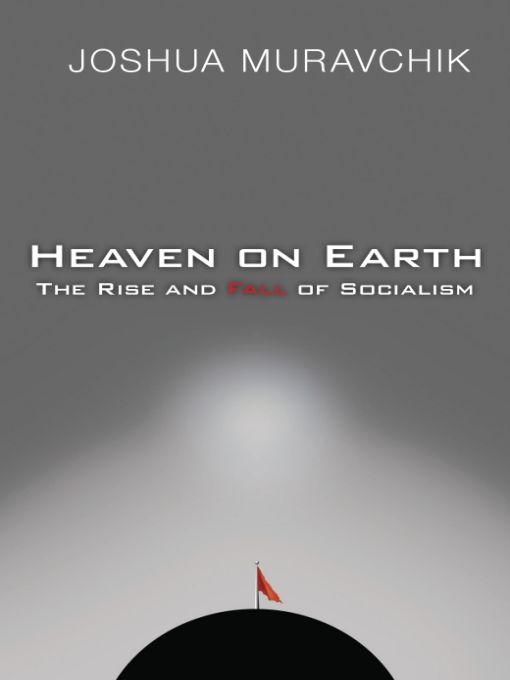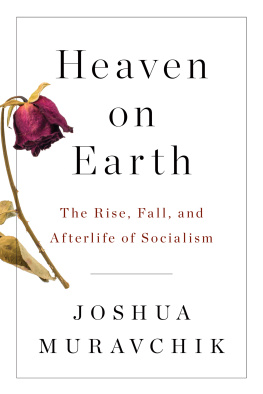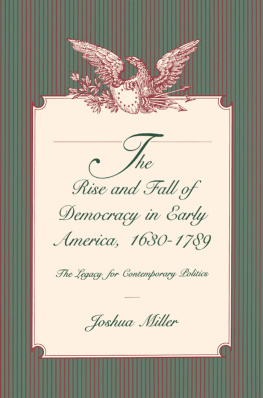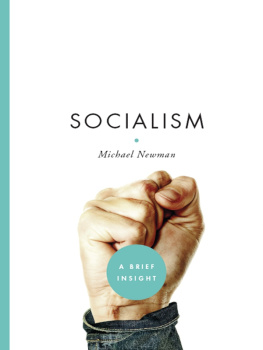Table of Contents
To Sally
The Christianimagines the better future of the human speciesin the image of heavenly joy. We, on the other hand, will have this heaven on earth.
Moses Hess, A Communist Confession of Faith, 1846
PROLOGUE
CHANGING FAITHS
SOCIALISM WAS THE FAITH IN WHICH I WAS RAISED. It was my fathers faith and his fathers before him.
My grandfather, Avraham Chaim Muravchik, grew up in a small shtetl outside Kiev in what was then the Russian Empire. Born in 1878, he received the orthodox religious training of every boy of his time and place. But like many others of that generation he turned away from formal Judaism by the time he entered high school, or gymnasium, as it was called.
It was in the radical student circle at gymnasium that he met my grandmother, Rachel. She was several years his junior since he had not been able to afford the school until he had worked for a time as a lumberman, while her family, which manufactured paper bags and lived in Kiev proper, was better off. Together they joined the most radical of the newly formed Russian leftist parties, the Socialist Revolutionaries. It was distinguished from the more Marxist-oriented Social Democrats by its endorsement of terror tactics and by its theory that the leading role in the revolution would be played by Russias peasantry rather than its proletariat.
Avraham Chaim and Rachel left for America in 1905, part of a wave of Jewish emigration touched off by an orgy of anti-Semitic violence that followed Russias defeat by Japan and the abortive attempt to overthrow the tsar. The peasants, it turned out, were more easily mobilized for pogroms than for revolution.
In America, the couple found work with the Yiddish-language Jewish Daily Forward, whose masthead was emblazoned with the famous injunction of the Communist Manifesto: Workers of the world unite! They settled in a Harlem tenement, in which my father, Emanuel, was born in 1916.
Emanuels boyhood was filled with the comings and goings of the exile branches of the Russian Students Organization and the Left Socialist Revolutionaries. (The party had split in 1917, and my grandparents stuck with the more radical half.) In 1929, Norman Thomas ran for mayor of New York on the Socialist Party ticket, and the campaign crystallized my fathers budding interest in socialism. He chose it as the topic of an eighth-grade paper, and after four intense days in the library pronounced himself a convert. A few months later, just after his thirteenth birthday, he joined the Socialist Party. It was a coming of age that substituted for a bar mitzvah.
My mother, Miriam, shared my fathers views albeit with softer ideological definition. Being of liberal spirit, however, they decided to refrain from systematically indoctrinating me and my brother as they raised us. Systematic indoctrination was scarcely necessary, at any rate, for the political cause was the center of their lives. It was discussed at the family dinner table and with their friends, who were mostly comrades. On car excursions, we whiled away the time by singing We Shall Not Be Moved and other old labor songs. I first visited our nations capital in 1958 at the age of eleven when my parents took us on the Youth March for Integrated Schools, one of the earliest civil rights demonstrations. By my teens, I was a seasoned protestor.
By then I, too, had joined the Socialist Party, eventually becoming the leader of its youth wing, the Young Peoples Socialist League. It was a small organization because socialism never caught on in this country, despite my fathers efforts and my own. (His have persisted for more than seventy years, while I became an apostate in my thirties and began to grope my way back to Judaism.)
If we were out of step with America, we took heart from knowing that America was out of step with the world. My comrade Michael Harringtonthe famous writer who became chairman of the Socialist Party in 1968, at the same moment that I became chairman of the youth wingboasted: Most of the people in the world today call the name of their dream socialism. I could not vouch for his math, but socialism undoubtedly was the most popular political idea ever invented.
Arguably, it was the most popular idea of any kind, surpassing even the great religions. Like them, socialism spread both by evangelization and by the sword, but no religion ever spread so far or so fast. Islam conquered an empire that at its height embraced 20 percent of mankind. It took 300 years before Christianity could speak for 10 percent of the worlds people, and after two millennia it can claim the adherence of about one-third of the human race. By comparison, within 150 years after the term socialism was coined by the followers of Robert Owen in the late 1820s, roughly 60 percent of the earths population found itself living under socialist rule of one kind or another. Of course, not all who lived under socialism believed in it, but not all who were counted as Christians or Muslims were believers either.
Once empowered, socialism refused to yield its promised rewards. The more dogged the effort to achieve it, the more the outcome mocked the humane ideals it proclaimed. Yet for a century and a half, no amount of failure dampened socialisms appeal. Then suddenly, like a rocket crashing back to earth, it all collapsed. Within a couple of decades, socialism was officially repealed in half the places where it had triumphed. In the other half, it continued in name only. Today, in but a few flyspecks on the map is there still an earnest effort to practice socialism, defended in the manner of those marooned Japanese soldiers who held out for decades after 1945, never having learned that their emperor had surrendered.
In this book I trace socialisms phenomenal trajectory. It is the story of mans most ambitious attempt to supplant religion with a doctrine about how life ought to be lived that claimed grounding in science rather than revelation. Although its provenance was European, it was taken up with ardor in China and Africa, India and Latin America and even in that most tradition-bound of regions, the Middle East. No other faith ever appealed as widely. It was not confined to salons and libraries but exerted itself as well in statehouses and on picket lines, barricades and battlefields. It did more than anything else to shape the history of the twentieth century.
Ironically, the power of this faith was to some degree obscured by the popularity of Marxist theory, which held that ideas were merely the surface froth thrown up by underlying currents of technological progress and material interests. This, too, was a seductive notion because it answered that most puzzling question: why do people think what they do? But this materialist interpretation of ideology has not stood the test of time, least of all in explaining socialisms own history. What material interests or technology caused the triumph of socialism, or its defeat, in Russia? Its transmission to China, Cuba and North Korea? Its appearance in other forms in Sweden, Israel, Tanzania, Syria?
The idea of socialism did not march through history of its own accord. It was invented, developed, popularized, revised, exploited and in some cases abandoned by a chain of thinkers and activists. It was modified again and again, sometimes for ulterior motives but also because, for all its unmatched allure, it proved maddeningly difficult to implement. I have chosen to tell the story of socialism through sketches of key individuals each of whom exemplifies a critical stage or form in its evolution. Some of these were seminal figures, responsible more or less single-handedly for a major turning point. Who can imagine communism without Lenin, fascism without Mussolini, or the peaceful self-nullification of the Soviet Union without Gorbachev? Other important episodes, such as the rise of utopianism or social democracy or the embrace of socialism by Third World states, cannot be traced to a single individual, so I have selected for portraiture the one whom I believe best represents each of these chapters in the drama.









![Joshua Backfield [Joshua Backfield] - Becoming Functional](/uploads/posts/book/120483/thumbs/joshua-backfield-joshua-backfield-becoming.jpg)



